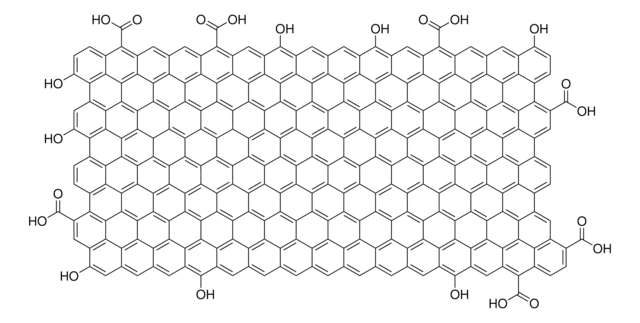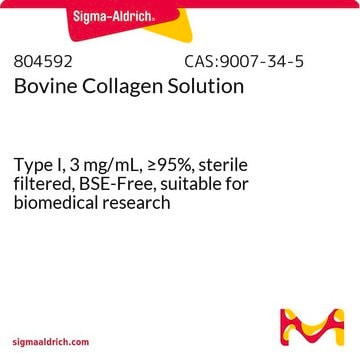934089
Ovine collagen
lyophilized, low endotoxin
Synonim(y):
CollOvine™ RDP
Zaloguj sięWyświetlanie cen organizacyjnych i kontraktowych
About This Item
Polecane produkty
Poziom jakości
Postać
lyophilized
zanieczyszczenia
Bioburden, none detected
≤0.1 EU/mg Endotoxin
kolor
white to off-white
Szukasz podobnych produktów? Odwiedź Przewodnik dotyczący porównywania produktów
Powiązane kategorie
Opis ogólny
Collagen is a major component of the extracellular matrix (ECM) and offers low immunogenicity, a porous structure, good permeability, and biocompatibility to promote cell viability, adhesion, spreading, proliferation and differentiation. Low endotoxin ovine collagen powder is derived from sheep and is a bovine or porcine alternative that is highly purified, fully traceable, and low endotoxin making it suitable for many biomedical applications.
Zastosowanie
- 3D bioprinting
- Tissue engineering
- Drug delivery
- Regenerative medicine
- Cell culture, encapsulation, expansion and differentiation
Cechy i korzyści
- Certified Disease Free Sheep
- 93-97% Type I Collagen
- 3-7% Type III Collagen
- 99% Purity
- Prion Free
Informacje prawne
CollOvine is a trademark of OviGenex LLC
produkt powiązany
Numer produktu
Opis
Cennik
Kod klasy składowania
11 - Combustible Solids
Klasa zagrożenia wodnego (WGK)
WGK 1
Temperatura zapłonu (°F)
Not applicable
Temperatura zapłonu (°C)
Not applicable
Certyfikaty analizy (CoA)
Poszukaj Certyfikaty analizy (CoA), wpisując numer partii/serii produktów. Numery serii i partii można znaleźć na etykiecie produktu po słowach „seria” lub „partia”.
Masz już ten produkt?
Dokumenty związane z niedawno zakupionymi produktami zostały zamieszczone w Bibliotece dokumentów.
Collagen as Bioink for Bioprinting: A Comprehensive Review
Osidak, et al.
International Journal of Bioprinting, 6, 270-270 (2020)
Collagen as Bioink for Bioprinting: A Comprehensive Review
Osidak E O, et al.
International Journal of Bioprinting, 6, 270-270 (2020)
Elizabeth E Antoine et al.
Tissue engineering. Part B, Reviews, 20(6), 683-696 (2014-06-14)
Type I collagen hydrogels have been used successfully as three-dimensional substrates for cell culture and have shown promise as scaffolds for engineered tissues and tumors. A critical step in the development of collagen hydrogels as viable tissue mimics is quantitative
Jana Stepanovska et al.
Biomedicines, 9(9), 1137-1137 (2021-09-29)
Bioprinting is a modern tool suitable for creating cell scaffolds and tissue or organ carriers from polymers that mimic tissue properties and create a natural environment for cell development. A wide range of polymers, both natural and synthetic, are used
Atiqah Salleh et al.
Biomedicines, 10(4), 816-816 (2022-04-24)
Tissue engineering products have grown rapidly as an alternative solution available for chronic wound and burn treatment. However, some drawbacks include additional procedures and a lack of antibacterial properties that can impair wound healing, which are issues that need to
Nasz zespół naukowców ma doświadczenie we wszystkich obszarach badań, w tym w naukach przyrodniczych, materiałoznawstwie, syntezie chemicznej, chromatografii, analityce i wielu innych dziedzinach.
Skontaktuj się z zespołem ds. pomocy technicznej






